Dragon's desire to turn away from the water is thwarted by the Imps who drag him forward in chains. Like other demonic characters in the Carnival, such as the Jab Molassies and the Beast, the Dragon's bonds refer directly to Trinidad's legacy of slavery. The irony of playing Mas is that playing a slave becomes an act of empowerment, since by choosing to play the role, one asserts the freedom to control one's fate.
Moreover, the conflation of Devils with slaves is an ironic play on one of the earliest masquerades in Carnival, in which French Creole planters would imitate the debased position of their own plantation slaves ( "Negues Jadins" in patois). After Emancipation in 1838, when former slaves were allowed full participation in Carnival, they adopted role of Negue Jadins and burlesqued the planters' characterization of themselves – an mockery of a mockery. Lovelace describes how Devil Mas involves the blackening of already-black skin, a gesture that recalls the white planters' "blackface" Mas while reclaiming the potency of black identity, "to make their very blackness a menace. " (113) The Imps play a dual role, as both instrument of the Dragon's bondage and as a kindred demonic spirits. Carnival scholar Max Harris suggests this merging of symbols recalls the shared iconography that links Devils and slaves, stating "black humanity had to be demonized by whites in order to justify slavery." (111, "Playing Devil" The Drama Review. MIT Press, Fall 1998)
Today, the Devil Mas theme of dehumanization still has relevance within the economic inequalities plaguing modern Trinidad. Our Imps dragged their dragon by a chain of Carnival beads typical of commerical "Pretty mas". The Imps themselves shared the Dragon's street-material aesthetic, with burlap wings, masks of brown corrugated cardboard and horns of razor wire. At the same time, their white hair, made from industrial plastic sugar sacks, refered back to their Negue Jadin plantation past. Their razor-wire arm bands presented a similar class paradox, recalling simultaneously the manacles of slavery and the fancy armbands that adorn the generic Pretty Mas costume.
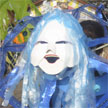 _____Continue to Sirens
_____Continue to Sirens
Click on any image to enlarge:
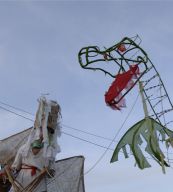 __
__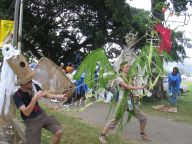
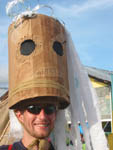
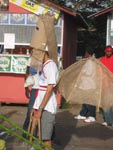
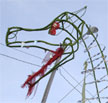 Back to Rights of Passage home
Back to Rights of Passage home